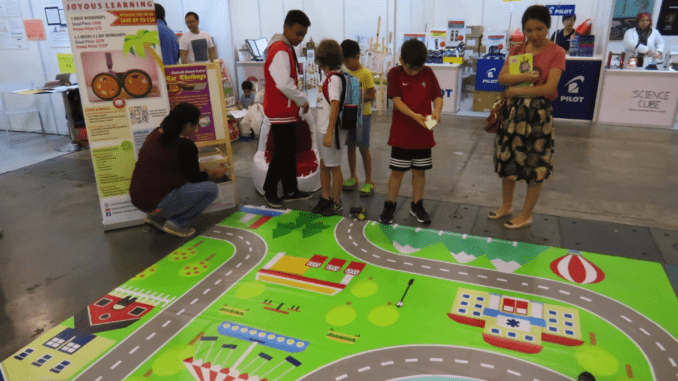
Imagine playing the popular mobile game Clash of Clans, except that instead of raiding other players, you answer maths questions instead.
That’s what Brainy Arkies is, a new mobile game from Marshall Cavendish that’s essentially a base building game like ‘Clash of Clans’, but with an educational element infused into the rewards and levelling up system.
“There is a need for us to innovate and develop new teaching methods,” said Marshal Cavendish’s Head of Publishing, Lee Fei Chen. She acknowledged that there was a need to retain students’ interest amidst the changing education landscape.
Brainy Arkies was launched last Thursday (10 November) at Happy Sparks, an experiential education event held at Expo over the weekend.
What’s a base building game?
Base building games like Clash of Clans are strategy games where you have to build your own settlement, building by building. It’s like an upgraded version of Sim City. Players perform actions to gain resources, which are required to build buildings. You accrue experience points with those actions, and enough experience points will propel you to the next level, opening up more options and improving existing abilities that you have.
In short, the more you play, the more powerful you become, and the more sophisticated your base becomes.
Brainy Arkies gives a new twist on the genre with maths questions that are aligned with MOE’s Mathematics syllabus. Instead of attacking other players (the usual actions available in most base building games), you answer maths questions instead. So the more quizzes you complete, the more powerful you become, and the more rewards you get.
What’s cool about Brainy Arkies
If you’ve played the popular Wii game Raving Rabbids, you’ll notice that the short yellow Arkies (short for “architects”), the main characters in the game, are similarly cute and animated. They’re not quite as violent though, so you don’t have to worry about children hurting themselves if they copy them.
The base building element is where it gets addictive. It follows the same formula of most base building games, with multiple resources required, cool down times for building, and rewards for completing certain achievements. Once you get emotionally invested in your Arkies, you’re going to want to level them up and expand their base.
What Brainy Arkies does is to use this addictive quality to motivate children to answer maths questions and in the process, practice and revise key concepts that have been learnt.
Questions range from multiple-choice to open-ended ones. No working required though, at least for the trial version. There’s also a good variety of question types that tests the same concept in different ways, and the correct solution is provided after each quiz that walks you through each question.
Questions are also given in worksheet/exam format, meaning that it’s in formal language, and black and white, rather than the colourful visuals of the rest of the game. This helps students get used to the academic rigour of classroom learning — it wouldn’t be great if they got too used to the bright cuteness of the Arkies when practicing Mathematics!
The downsides of Brainy Arkies
However, questions and answers can get rather long, mandating that you scroll up and down on a mobile phone. It’s recommended that you play it on a tablet instead, where the larger screen length means you can view the entire question at once.
The dialogue is also a little awkward — the excessive use of ellipses (…) might not be something that you would want your children to mimic. However, Brainy Arkies is designed to teach Mathematics, not English, and the dialogue is still grammatically correct.
You can learn more about Brainy Arkies at their website. There’s a free-to-play version for you to try, before you sign up for one of their subscription packages.
Happy Sparks
Brainy Arkies debuted at Happy Sparks, which was held from 10 to 12 November at Expo Hall 4. The education fair showcased the extent to which technology is essential to education these days, with an EduTech Zone and various programming classes available.
“Happy Sparks was started to create out-of-classroom and cutting-edge experiential learning experiences said Times Publishing Group CEO, Siew Peng Yim.
With several big name exhibitors like National Library Board, Flying Cape, and Samsung, children and parents had a wide variety of activities to take part in. Wide walkways meant that it wasn’t a claustrophobic squeeze like most fairs are nowadays, so patrons could take their time visiting all the booths.
“Cha-Ching, they have a teaching moment, where they talk about they can save, how they can earn,” said Hameiza Chia, 44, referring to the financial literacy booth by Prudential. The admin executive came to the fair with her husband and their nine-year-old twin sons.
“If there’s another similar fair, I’ll certainly come again,” said Lee Pei Si, a 36-year-old homemaker. She and her husband were impressed by the activities available for their four-year-old daughter, and found Flying Cape to be an interesting concept.
Flying Cape is an online marketplace that collates enrichment activities by different education providers, sort of like Alibaba for Singapore education providers.
Despite the technology theme for the fair, the range of vendors felt rather unfocused. This was probably due to the target age group, which was 3— 12. That’s a pretty big age range to cater to!
“We hope to make [Happy Sparks] an annual event,” said Siew.
This article was also published on Yahoo!.
If you liked the article, follow me on Facebook and Twitter for more (presumably) good updates!
To get in touch with me, send an email!
Leave a Reply